Jewish Museum | From the Margins: Lee Krasner and Norman Lewis, 1945 – 1952
January 30, 2015
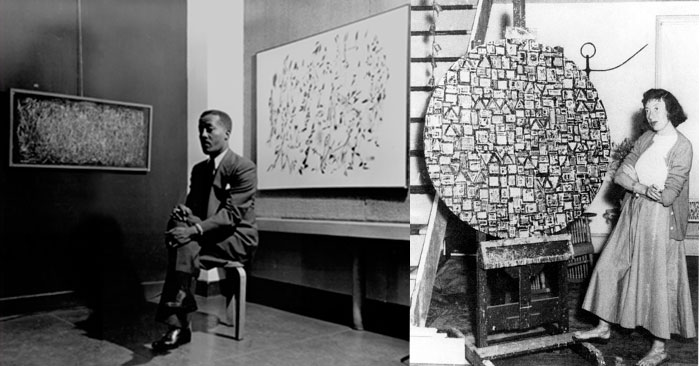
Left: Norman Lewis, From the Willard Gallery Archives. Collection of Kenkeleba House. Art
© The Estate of Norman W. Lewis, Courtesy of Iandor Fine Arts, New Jersey
Right: Lee Krasner with Stop and Go, c. 1949. Photographer unknown.
© 2014 The Pollock- Krasner Foundation / Artists Rights Society (ARS), New York
This exhibit featured the work of two artists I knew very little about — which was sort of one of the points of the show: both had been overlooked by critics in their time, in part because she was a woman and because he was African-American. My main sense of Krasner, prior to this exhibit, was as Jackson Pollock’s wife in the bio-pic Pollock.
Both of these artists brought their cultural background to their artwork at the same time that they experimented in abstraction, removing all references to the world outside the paintings. Lee Krasser turned her paintings into a form of ascetic writing, which she worked from right to left, like the Hebrew she had learned as a young Jewish girl. Norman Lewis borrowed some of his angular style from Harlem renaissance painters while rendering them in an abstract form. His style, and some of his paintings’ titles evoke jazz (like Magenta Haze, named after a Duke Elington song).
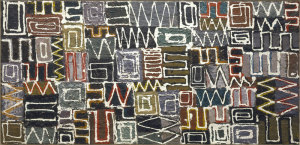
Lee Krasner – Untitled, 1948
© 2014 The Pollock-Krasner Foundation / Artists Rights Society (ARS), New York
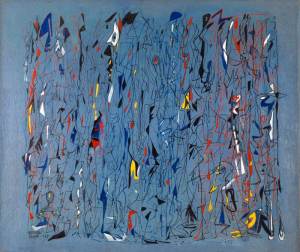
Norman Lewis – Twilight Sounds, 1947
© The Estate of Norman W. Lewis, Courtesy of Iandor Fine Arts, New Jersey
Yet neither artist wanted to be pigeonholed as a “woman artist” or a “black artist” — while they felt that their abstract paintings moved beyond these labels, the critics of their times always related to their art in these terms.
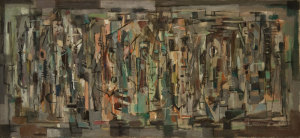
Norman Lewis – Crossing, 1948
© The Estate of Norman W. Lewis, Courtesy of Iandor Fine Arts, New Jersey
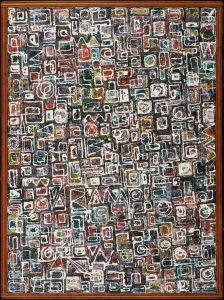
Lee Krasner – Composition, 1949
© 2014 The Pollock-Krasner Foundation / Artists Rights Society (ARS), New York
There were certain other ways that these works were related. Some of these connections relate to abstract expressionism in general — both artists make work that have an “all-over” look that Jackson Pollack made famous. Also , at the center of the show are the paintings that Krasner called “Little Images” and those that Lewis called “Little Figure” paintings. Both artist were creating small paintings in small domestic space (Krasner painted in an upstairs bedroom, Lewis in his apartment). While in the gestural tradition of the Abstract Expressionists, both were working with smaller gestures. Also both experimented with slightly usually shaped canvases, as you can see in the wide paintings in this post.
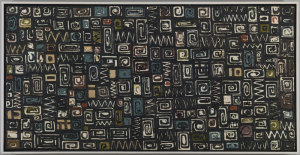
Lee Krasner – Untitled, 1949
© 2014 The Pollock-Krasner Foundation / Artists Rights Society (ARS), New York
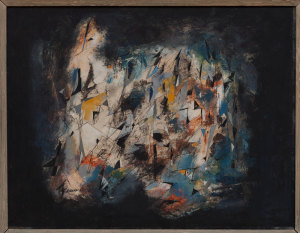
Norman Lewis – Florence, 1947
© The Estate of Norman W. Lewis, Courtesy of Iandor Fine Arts, New Jersey
Tech bonus: This show ends with a small listening area with a low table and chairs in an appropriately mid-century design, with headphones for museum visitors to listen to bits of interviews with Krasner and Lewis. This first-person audio is a refreshing change from the the teacherly style of the typical museum audio.
© 2025 50 MUSEUMS IN 70 WEEKS | Theme by Eleven Themes

Leave a Comment